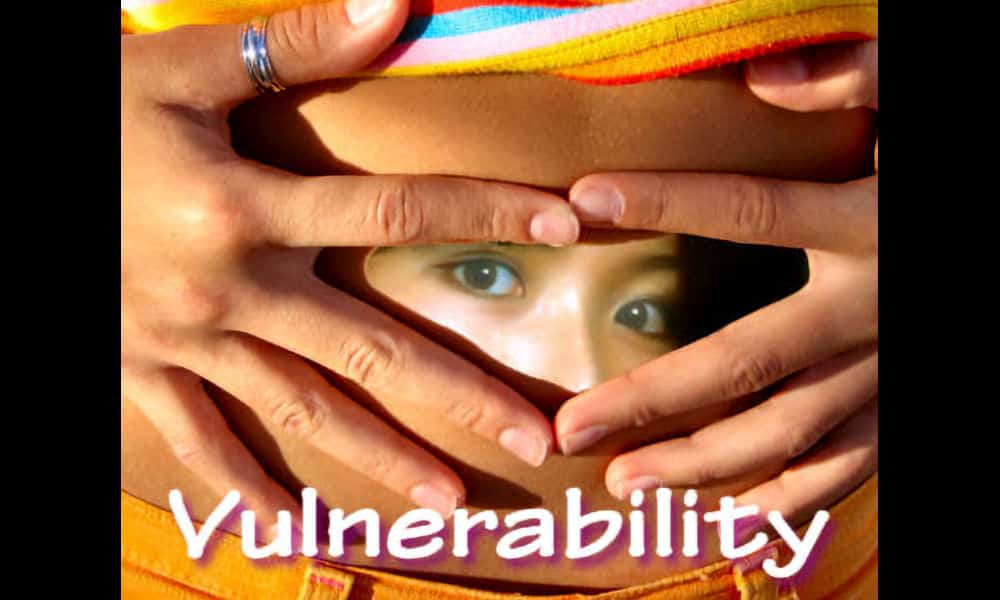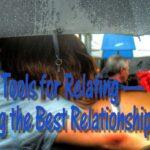- Ideas for Zen Living: 12 Presence Presents
- 5 Communication Tips
- 10 Quick Examples of Zen Living
- Better relating — 6 Ideas
- Fearless Living — 7 Tips
- 5 ways to pay attention
- 10 Zen Principles to Help You Live Life Better
- 7 Ways to Live in This Endless Moment
- 5 Key Concepts for Zen Living
- 9 Tools for Relating
- 3 Riffs on Relating
- Vulnerability — 5 things
- 5 Life Lessons You Need to Get
- 9 Ways to Screw up a Relationship
- 10 Things Your Mommy Forgot to Tell You
Vulnerability — Especially in the West, vulnerability is considered a weakness. This is taught to us by our parents and tribes, who are, of course, concerned for our safety.
However, this fear of vulnerability is ingrained at a deep level, to our detriment, once we become adults. (This is one reason most adults aren’t!)

Living Life in Growing Orbits is our workbook.
52 weeks of daily exercises designed to help you figure yourself out.
Check out Living Life in Growing Orbits on our site.
Direct link to Amazon
Purchase digital versions (Apple, Nook, Kobo, etc.) from this page
1. The courage of being vulnerable -
Consider: most people are looking for intimacy — and by that I mean, simply, “to be known.”

will notice me!
But they fear “letting others in” or at least want their safety 100% assured, before they will let down their guard. This is so because of the ingrained and mistaken belief that one can be hurt through the betrayal of another.
No one hurts us but ourselves
Sure, people betray us. People walk away, leave us, judge and criticize us. This is a part of life. And yes, there is pain. But the pain is self-inflicted, as we tell ourselves awful stories.
The norm is to roll into a tight ball and to refuse to risk again.
An alternative is to open up and risk it all, time and time again.
Sure, such an action means that something might happen, and you might just choose to again pick up the knife of self-flagellation, and go at yourself again.
The alternative to vulnerability is not courage, but isolation, “woundedness.”
From a bodywork perspective, the sign of isolation and fear is “legs tightly closed, arms crossed over the heart, head down.” Like the picture, above.
The cure is opening up.
Which takes courage. Not because there is a big bad boogeyman out there, waiting to pounce. It’s all about you, and in this case, it’s all about facing up to how icolating fear can be.
Once I truly and deeply understand that all psychic pain is self-inflicted (All of it. 100% Everything going on inside of you is you, etc.) I can be gentle and kind with myself. I can uncross my arms, open my legs, plant my feet firmly on the ground, and look up.
And I can speak my deepest, most intimate truth.
2. Being vulnerable means speaking your truth
Not the truth. Not other people’s truth. Not the truth of “Everybody knows.” The truth that comes from
“Here is what is so for me, and here is what I do with this truth.”
Mostly, we try to defend our truth, and in this way maintain both control and a (mistaken) sense of invulnerability.
Speaking your truth is an interesting concept. Most take it to mean, “Endlessly regurgitating the same story, so that others will agree with me.” For me, it begs the question, “What do you want?” Which tends to be the question I ask when someone starts into this pattern.
Speaking your truth is not about getting others on board with your stuckness. It’s opening yourself to what lies directly beneath the stories.
3. Vulnerability is here and now
Which explains why it’s not about stories. Stories, at best, serve as a framework for true vulnerability.
Vulnerability is about letting out what is going on for you, right now, with no explanations. This is me, right now. And part of “me, right now,” are the emotions that are happening inside. Not descriptions of the emotions, not blaming someone for the emotions, but rather the emotions themselves.
Once you are able to both see this and express it, you’ll also notice that emotions are fleeting. I can be sad, then bored, then weepy, then laugh-filled, then have the feeling of “nothing much.” But only if I do not cling to the “endless reality” of my story, a.k.a. thinking too much.
4. Vulnerability is unguarded

Unguarding yourself means being willing to both own and share your in-the-moment reality, without much (or any) filtering. Again, this flies in the face of our conditioning.
Our tribes shut this sort of sharing down. Parents who fear intimacy and emotions tend to either distract (“You have a great life! What do you have to be sad about?”) or threaten, (“I’ll give you something to be sad about!”) to get us to stop emoting.
How much better to teach our children to responsibly express and process their emotions!
Being unguarded is not about being unhinged, although that’s OK too.
The point of letting go is to clear the decks so that you can begin to shift what is not working. Letting go gives us an opportunity to see how we are structuring our stories to stay stuck, and to commit to, and actually do something new and refreshing. It’s not meant as an exercise in self aggrandizement, and emphatically is not a game to stay stuck, while pretending to “get it.”
Unguarded means loosening the filters, and expressing yourself as you are, with focus and clarity.
5. Vulnerability is body-work
As compared to mind work. You can’t be vulnerable if all you do is describe what you are feeling, thinking, and wanting. This is where story telling blossoms, and “Everyone knows…” rears its ugly head.

While describing is certainly a step in an interesting direction (as opposed to stuffing it all,) it’s only quasi-vulnerability.
Many say, “Something comes up, I start to discuss it, get upset, and immediately leave the room, so that I can go ‘figure it out.’ Once I’ve calmed down, I come back and tell my partner what I’ve discovered.”
Yikes.
This is running away, actually, couched in the rubric of dialog.
This is feeling what’s going on in your body, freaking out, and rapidly escaping to the head.
We’d suggest staying in your body, and letting your partner participate in the process, without running away. If you do so, you will likely discover an interesting thing.
There are points in your body just screaming for a bit of pressure to be applied. And when pressure is applied, all kinds of sounds and emotions emerge, then fade, and whatever the drama was, fades with them.





